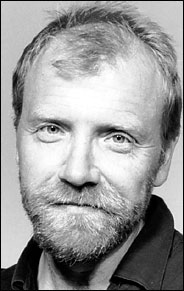
George Saunders is the author of eleven books, including Lincoln in the Bardo, which won the 2017 Man Booker Prize for best work of fiction in English, and was a finalist for the Golden Man Booker, in which one Booker winner was selected to represent each decade, from the fifty years since the Prize's inception. The audiobook for Lincoln in the Bardo, which featured a cast of 166 actors, was the 2018 Audie Award for best audiobook.
His stories have appeared regularly in The New Yorker since 1992. The short story collection Tenth of December was a finalist for the National Book Award, and won the inaugural Folio Prize in 2013 (for the best work of fiction in English) and the Story Prize (best short story collection).
He has received MacArthur and Guggenheim Fellowships, the PEN/Malamud Prize for excellence in the short story, and is a member of the American Academy of Arts and Letters, and the American Academy of Arts and Sciences. In 2013, he was named one of the world's 100 most influential people in the world by Time magazine. In support of his work, he has appeared on The Colbert Report, Late Night with David Letterman, All Things Considered, and The Diane Rehm Show.
He was born in Amarillo, Texas and raised in Oak Forest, Illinois. He has a degree in Geophysics from the Colorado School of Mines and has worked as a geophysical prospector in Indonesia, a roofer in Chicago, a doorman in Beverly Hills, and a technical writer in Rochester, New York. He has taught, since 1997, in the Creative Writing Program at Syracuse University
George Saunders's website
This bio was last updated on 09/29/2022. In a perfect world, we would like to keep all of BookBrowse's biographies up to date, but with many thousands of lives to keep track of it's simply impossible to do. So, if the date of this bio is not recent, you may wish to do an internet search for a more current source, such as the author's website or social media presence. If you are the author or publisher and would like us to update this biography, send the complete text and we will replace the old with the new.






Your guide toexceptional books
BookBrowse seeks out and recommends the best in contemporary fiction and nonfiction—books that not only engage and entertain but also deepen our understanding of ourselves and the world around us.